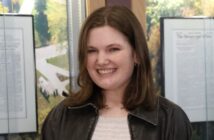Reading a book at the beach is infinitely more enjoyable than not reading on the beach, but is that really so shocking?
Many of my peers may choose to indulge in more obvious pleasure reads from the likes of Colleen Hoover, Sarah J. Mass and Sally Rooney. For me, I’ve found myself returning to politics when met with free time at the beach. These are often books I picked out at local book sales and never got around to reading but am nonetheless interested in learning more about — and what better way to read about politics than with the peaceful metronome-like background of ocean waves?
This summer, I read “The Social Animal” by David Brooks. The book follows a hypothetical American couple from their vastly different childhoods into their successful adulthoods, using their life maps as an explanation of human nature — from biology to sociology to the subconscious mind and how it’s all related.
One of the most fascinating points was the impact of American hyperindividualism. In the mere 150 words I’ve just written, I’m already guilty of it just in this piece. Here I am trying to paint myself as somehow “different” and therefore somehow “better” for individualizing myself via the content I read. But we’re conditioned to do this. And it’s playing a part in this buzzword we Americans like to point at called “polarization.”
Brooks writes in his book that in Western culture, children are focused on individuality, whereas in Asian culture, children are raised on ideas of interdependence and connectedness.
He references the research of social psychologist Richard Nisbett. In one particular study by Nisbett, American 6-year-olds make references to themselves three times more than Chinese six-year-olds. When asked about themselves, Americans tend to exaggerate ways in which they are different and better than the crowd, while Asians exaggerate the traits they have in common and the ways they are interdependent.
“Westerners tend to focus narrowly on individuals taking actions, while Asians are more likely to focus on contexts and relationships. He argues that at least since the time of classic Greece, Western thought has emphasized individual action, permanent character traits, formal logic, and clearly delineated categories. For an even longer period, Asian thought has emphasized context, relationships, harmony, paradox, interdependence, and radiating influence.”
What does this mean for us in American society? As children, we’re constantly trying to find niches to build our own identities and prove our “talents.” Hence, the emphasis on sports, hobbies and arts. Even the rhetoric of finding your niche to propel you into your career forces you to think individually. It’s a never-ending forethought of what “I” am good at and what “unique” qualities make me better than others.
We then uphold our individuality to a science when we write college essays meant to make us stand out or land interviews in the real world where we’re meant to have perfectly-curated skill sets that are unlike anyone else’s. This concept of “American exceptionalism” is always telling us that we, speaking only for ourselves, are somehow the exception to the rest.
This isn’t to say you aren’t your own best advocate. That you are, and no one is going to live your life for you.
But there is harm in simply thinking with an “I” mentality — it blinds us from thinking about what qualities we have that may intertwine with one another. It can deter us from ever considering a competing point of view — when we are so sure we have nothing in common with someone we labeled as a nemesis.
What good could be done when we think with an interdependent mind, one that focuses on communities and our commonalities, one that emphasizes a team mindset? Obama’s 2008 political slogan, “Yes We Can” did that, and to his own victory. The polarization of today’s cultural consciousness has shown Americans are not able to detach themselves from their individualized characteristics.
Thinking with a community mindset forces us to deploy empathy. Interdependence shows us we are reliant on others.
The community and friendships I’ve found in my college experience have propelled me to reflect on my own identity. I am immensely grateful for all of the people who have pushed me outside of my comfort zone, many of whom I may have never connected with if not for our discovered commonalities, both big and small. College is a time to build on social identities, and more importantly, to find groups to relate with.
We are, in fact, social animals, and we could all benefit from thinking more about how we may be more similar than we are different.






Comment policy
Comments posted to The Brown and White website are reviewed by a moderator before being approved. Incendiary speech or harassing language, including comments targeted at individuals, may be deemed unacceptable and not published. Spam and other soliciting will also be declined.
The Brown and White also reserves the right to not publish entirely anonymous comments.